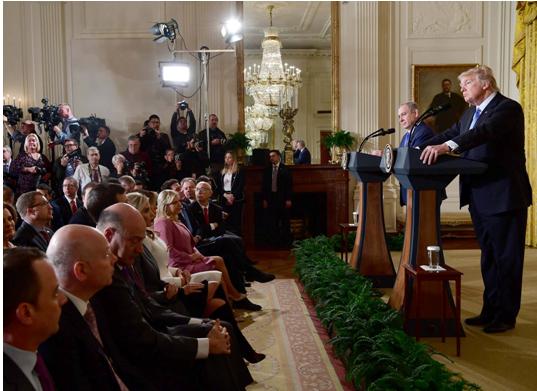During Prime Minister Benjamin Netanyahu’s meeting in Washington with President Donald Trump on Wednesday, February 15, a bloc of left-wing members of the Knesset and activists from peace and human rights organizations held a conference in the Israeli parliament to mark 50 years of Israel’s occupation of the Palestinian territories. The conference focused on the necessity of Israel to decide between a just peace with the Palestinians or a road that will lead to apartheid and war.

Israeli Prime Minister Benjamin Netanyahu and President Donald Trump addressing the press after their meeting in Washington, February 15, 2017 (Photo: GPO)
Joint List Chairman MK Ayman Odeh (Hadash) opened the conference saying, “There are two ways forward: peace or apartheid – there is no other path. A Palestinian state next to an Israeli state, upholding UN Resolution 242. Peace is the truth and the way forward for the two nations.”
“We meet here today, only a moment before Prime Minister Benjamin Netanyahu and US President Donald Trump will be holding their no hope summit, offering only war and incitement,” Odeh said. “We are meeting to say that between the Jordan River and the Mediterranean Sea there is a majority of Israelis and Palestinians who want peace,” he continued. The Joint List leader further indicated that even as “the Palestinians who live in the West Bank are leading the efforts to end the occupation, we in Israel are trying to convince Israelis that it is also in their interest” to make peace. He concluded that recent verbal attacks on Israeli Arabs and the Supreme Court have come “because a nation that occupies another cannot remain a democracy.”
Hadash MK Dov Khenin (Joint List) said he felt compelled to change Odeh’s formulation of the options which Israel faces. “The choice is either peace or war. Without peace, we will be dragged into a new and dangerous war that will hurt all of us – Palestinians, Israelis and the entire Middle East,” Khenin said. He accused Netanyahu and Trump of being “stubborn, closing their eyes and ears to the military rule over a people that does not want this rule – closing their ears to the suffering… We want to hear the voices of suffering and to be heard ourselves.”
Hagai El-Ad, head of B’Tselem – The Israeli Information Center for Human Rights in the Occupied Territories – focused on the recently passed settlement Regularization Law. “I want to praise the Knesset… which after almost 50 years is finally starting to tell the Israeli public the truth… with the ‘expropriation law’ … being an illegal Israeli land grab of private Palestinian land.” El-Ad continued saying that, in many ways, the Regularization Law is nothing new, arguing that Israel had been stealing Palestinian land for decades. However, he said that, until now, Israel had sugarcoated land grabs, acting as if it respected Palestinian rights in accordance with certain principles and that the occupation was temporary; but that the new law “revealed the truth about Israel’s long-term intention to continue the occupation and rule over” the Palestinians. The Association for Civil Rights in Israel, Yesh Din: Volunteers for Human Rights and other organizations expressed similar views, criticizing the Regularization Law.
MK Michal Rozin (Meretz) told the attendees that they must continue to meet, “to return the discussion of the occupation to the center of public discourse… People are trying to obscure the fact that there have been 50 years of occupation. This is an anomaly… we have reached the point where we must deal with it.”
EU Ambassador Lars Faaborg-Andersen addressed the conference, stating, “The EU view is quite clear: We are in favor of a two-state solution. We have sketched out what it looks like. We have put on the table a series of practical steps to approach the two-state solution and to reverse negative trends on the ground both on the Israeli and the Palestinian side.” Faaborg-Andersen said that eventually Palestinians and Israelis would need to decide on the parameters of peace, and that in the meantime it was important “to have public debate on the issue of occupation.” Diplomats from a wide range of countries also attended the event, including representatives from Germany, Britain, Austria, the Netherlands, Spain and Brazil, as well as from the UN. Muhammad al-Madani, the head of the Palestinian Authority’s Committee for the Israeli Public, addressed the conference via video because he had been prohibited by Israel from entering Jerusalem, and expressed strong support for the two-state solution.
Statements by Trump to the effect that an Israeli-Palestinian peace does not have to entail Palestinian statehood caused consternation on Wednesday among several Israeli MKs. Hadash MK Yousef Jabareen (Joint List) said that if the Trump administration indeed backs off from the two-state solution, it will be going against an international consensus, including Arab and Muslim countries and the Palestinian leadership. “The support of the US is definitely crucial and any change in policy would be a slap in the face of the international community,” he said. “I think the two-state solution is still the most feasible solution. However, because of increased settlement building we have started the countdown for [the end of] this solution. Unfortunately, the actual alternative on the ground doesn’t seem to be one democratic state or a bi-national state, but a Jewish, Zionist state controlling all of Mandatory Palestine and leaving Palestinians with some kind of self-rule that would look like Bantustans,” he said.
MK Jabareen said he hopes other countries will exert influence on Washington so that it does not abandon the two-state solution. “There is a need to emphasize that resolving the conflict is not just a Palestinian interest, but is an international interest and that there can be no peace without addressing the rights of the Palestinian people. I hope other players in the international arena like the European Union will make it clear to the US that it needs to stick to international standards.”


